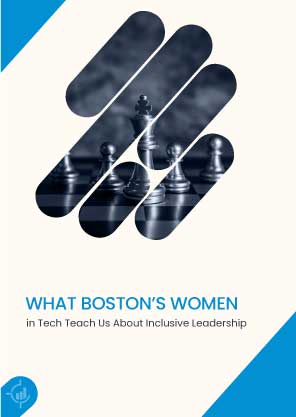or call: +1 (845) 347-8894

or call: +1 (845) 347-8894

In early 2025, Boston’s Seaport Innovation District hosted a sold-out leadership forum where over 400 women technologists, from AI researchers to cybersecurity chiefs, gathered under one roof. The panels were sharp, the Q&A sessions honest, and the message was clear: inclusive leadership isn’t about making room at the table, it’s about redesigning the table itself.
Organizations that embrace inclusive leadership models are no longer just doing the right thing; they’re gaining a measurable strategic edge. Boston’s women in tech are not simply advocating for equity. They’re proving through results that inclusive leadership improves resilience, innovation, and profitability. Their influence marks a turning point: inclusion has evolved from a cultural conversation to a core performance lever for technology-driven enterprises.
Boston’s rise as a tech epicenter is no accident. With institutions like MIT, Harvard, and Northeastern feeding a vibrant startup and research ecosystem, the city has also emerged as a model for diverse, inclusive innovation.
According to a recent McKinsey report (2025), companies in the top quartile for gender diversity on executive teams were 39% more likely to outperform peers on profitability. In Boston, this dynamic is playing out in real time, particularly in cybersecurity and enterprise software firms, where women now represent nearly 32% of senior leadership roles, up from just 18% in 2018.
The most compelling insight from Boston’s women in tech isn’t about representation alone; it’s about leadership strategy. Here are three ways inclusive leaders in Boston are redefining tech leadership:
In interviews with tech leaders at Cambridge Robotics and NovaSec AI, a recurring theme emerged: decision rights are distributed based on expertise, not hierarchy. At NovaSec, for instance, incident response simulations now include ethical engineers, junior developers, and compliance officers — not just senior architects.
This model treats cognitive diversity as a resource to reduce failure rates, not just as a cultural goal. The business result? NovaSec reduced its security audit remediation backlog by 41% year over year.
At GenMedix, a Boston-based health AI company, product leads have redesigned their entire build-test-deploy pipeline with inclusivity in mind. This includes onboarding a rotating team of frontline caregivers, non-native English speakers, and patients with disabilities during prototype phases. This practice has surfaced previously overlooked usability issues, resulting in:
Inclusion, here, isn’t branding — it’s about building products that serve more people better, the first time.
Boston’s women leaders are not just changing how teams operate; they’re transforming how teams stay together. At VortexLink, a cybersecurity firm with 800+ employees, leadership noticed high attrition among women and minority engineers. After creating an internal mentorship council co-led by women directors, attrition dropped by 38% within 12 months.
What’s more impressive is that product cycle velocity increased by 14%, driven by more stable teams and fewer transitions between ownership phases. This proves a critical point: inclusion reduces operational friction. It fosters psychological safety, the cornerstone of innovation and speed in secure enterprise environments.
Boston’s inclusive leaders are rethinking power itself. Rather than top-down command structures, many organizations are adopting co-ownership models, where every team member is responsible for not only delivery but also well-being, escalation transparency, and ethical risks.
A standout example is NeuroSpark Systems, where each project squad elects a “dev guardian” — a rotating role responsible for ensuring minority voices are heard in planning sprints.
“We no longer ask, ‘Did this meet spec?’ We ask, ‘Did every voice get into the spec?’” says Lauren Chou, their Chief Platform Architect. That subtle shift has improved audit trail integrity, boosted team satisfaction scores by 29%, and reduced code rollback rates post-release.
Finally, inclusion shows up most clearly under pressure. During a ransomware scare in Q1 2025, CivicNet, a Boston-based data infrastructure firm, credited its diverse leadership team with preventing escalation. While the tech team focused on containment, the VP of Communications, a former journalist from Nigeria, flagged a language-access issue in their crisis response site. That same day, the site was translated into five languages, avoiding public confusion and preventing reputational damage.
This underscores a truth many overlook: inclusion strengthens resilience. A cognitively diverse team will see risks and solutions that homogeneous teams simply miss.
While many organizations discuss inclusion in vague terms, Boston’s women in tech are operationalizing it – embedding it in hiring, governance, product cycles, and performance reviews. And they’re doing it with results. A 2025 study by Deloitte noted that Boston tech companies with high diversity scores had 25% faster product cycles and were twice as likely to attract top-tier tech talent. The report also identified inclusive leadership as the #1 driver of organizational trust in these firms.
Across interviews with top IT security and networking executives this year, a new pattern is emerging: inclusion now directly informs tech architecture. Here’s how:
As a strategic takeaway for tech executives reading this, here’s a 2025-ready Inclusive Leadership Checklist inspired by Boston’s top women in tech:
What’s happening in Boston is not isolated. It’s a bellwether for the next generation of tech leadership – one that views inclusion not as charity, but as strategy. This shift isn’t theoretical. It’s measurable, repeatable, and exportable.
As more tech hubs study Boston’s approach, from Bangalore to Berlin, one lesson stands out: Inclusive leadership scales innovation. And in an era defined by AI ethics, security breaches, and workforce evolution, that kind of leadership is what will define market winners in 2025 and beyond.
Boston’s mix of top-tier universities, thriving startups, and progressive corporate culture has positioned it as a national leader in inclusive tech leadership, with women now holding 30 %+ of senior roles in cybersecurity, AI, and enterprise software.
Inclusive leadership fosters faster decision-making, diverse problem-solving, and stronger retention. Boston tech firms practicing it have reported up to 40% lower attrition and 25% faster product cycles.
They’re implementing co-ownership governance models, inclusive feedback loops, ethics-integrated product reviews, and neurodiverse hiring strategies that align with performance KPIs.
Yes. A 2025 McKinsey report found companies with diverse leadership are 39% more likely to outperform peers in profitability, an effect already visible in leading Boston firms.
By treating inclusion as a design principle, not a policy checkbox, embedding it into product development, crisis response, hiring, and leadership accountability systems.
To participate in our interviews, please write to our IntentTech Media Room at sudipto@intentamplify.com




